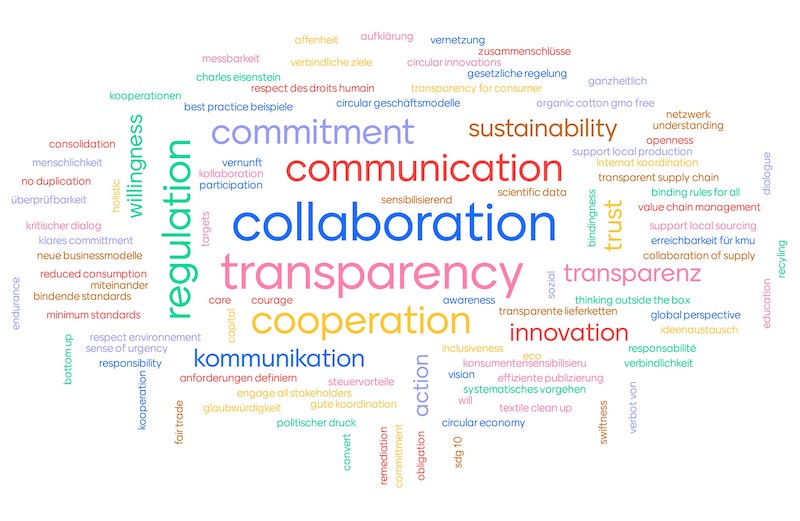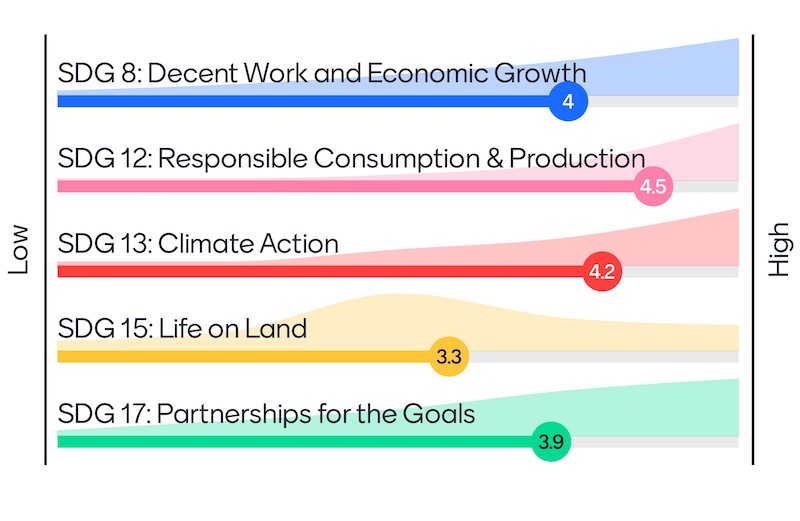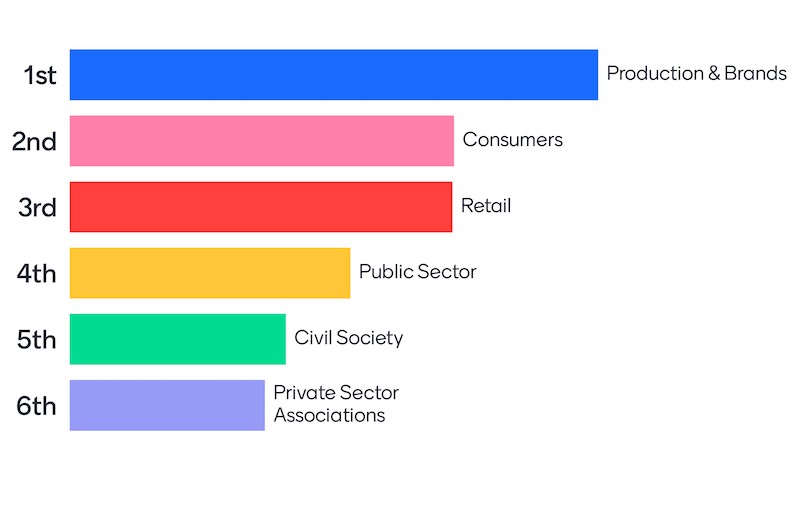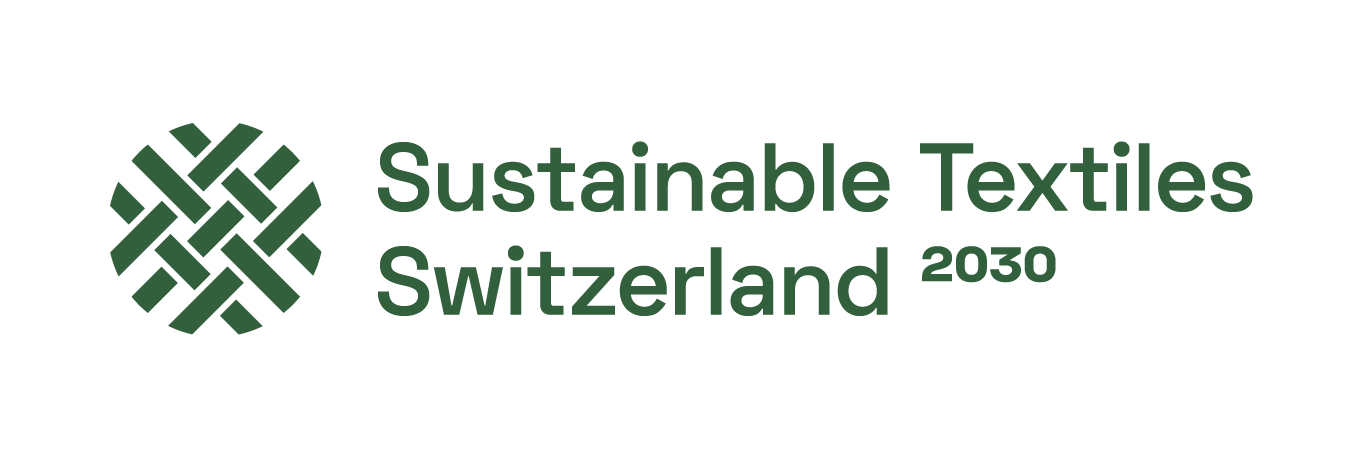
Successful Kick-off of the Target Dialogue
The word cloud above created by the participants of the Kick-off event for the multistakeholder dialogue of STS 2030 makes the message quite clear: Collaboration and transparency are key for the achievement of the SDGs in the Swiss textile and clothing sector. The consortium would like to thank the over 100 participants from the private sector, the public sector, from science and from civil society. In case you missed the event, you can watch the recording or find some key insights below. There are only 10 years left to contribute to the achievement of the SDGs in the Swiss textile and clothing sector – let’s do it together!
a) Consortium presents Key Targetfields

Nina Bachmann from Swiss Textiles, Philipp Scheidiger from Swiss Fair Trade and Pierre Strub from amfori presented the origin, the current activities and the outlook of the program Sustianble Textiles Switzerland 2030. Importantly, the consortium presented the five key target fields identified based on the potential for impact by the Swiss textile and clothing sector:
SDG 8: Decent Work and Economic Growth
SDG 12: Responsible Consumption and Production
SDG 13: Climate Action
SDG 15: Life on Land
SDG 17: Partnerships for the Goals
b) Audience Rating on the Relevance of the SDGs
The audience was invited to rate these SDGs according to their relevance for a sustainable and competitive Swiss textile and clothing sector. As the results in the graph below show, SDG 12 & 13 are considered the most and SDG 15 the least relevant. As a next step possible targets will be transparently discussed with key stakeholders in four virtual Open Meetings in Jauary 2021.

c) Panel Discussion: Partnerships for the Goals

The panel members from left to right: Miges Baumann, Adrian Huber, Anne de Chambrier, Anna Vetsch, Peter Flückiger
In the panel discussion representatives of the key stakeholder groups from the textile sector shared their insights on sustainability efforts and the need for collaboration:
Peter Flückiger, Director of Swiss Textiles, described two ways in which the association supports the sustainability efforts of their members as Swiss based but internationally oriented small and medium enterprises: Fistly by providing innovative impulses and secondly by strengthening networks and fostering the dialogue with other stakeholder groups. He also emphasised the opportunity of voluntary sustainability measures for the Swiss textile and clothing sector.
Adrian Huber, Head of Corporate Responsibility at Mammut described their ambition to find new ways of doing business and to set a good example in the sector. He also highlighted the importance of science based targets and their goal to use visibility of the sports and leisure sector to sensitize consumers.
Anna Vetsch, Project Manager Sustainability at Coop and Chairwoman of amfori in Switzerland observed a clear positive trend in the relevance of sustainability. She also mentioned challenges arising from being a big player in Switzerland but only a small global player. In this context she emphasised the opportunity of rethinking B2B relations: It is key to join forces and collaborate on concrete projects along the supply chains.
Anne de Chambrier, Programme Manager at SECO and responsible for the cooperation with STS 2030 represented the public sector. According to her, the opportunity of STS 2030 is to encourage collective action for sustainable practices between different stakeholders. Additionally, she emphasised the importance of linkages to the producer countries for example through the activities of ILO. She ended with an African proverb: « If you want to go fast, go alone; but if you want to go far, go together. »
Miges Baumann from Brot für alle was the representative from the civil society and member of the board of Fair Wear Foundation. The focus of his work being good working conditions in the Global South, he especially emphasised the importance of binding processes for auditing and impact measurement. He also called for a focus to guarantee freedom of association and collective bargaining, living wages as well as access to remedy in line with UN Guiding Principles including effective grievance mechanisms.
d) Stakeholder Rating and Chat Log
The audience was invited to rate different stakeholders in the textile and clothing sector according to their relevance to achieve the SDGs in the Swiss textile and clothing sector with 1 being the most relevant. The results in the graph below show that production and brands are considered the most relevant stakeholder group and retailers and consumers share the second place. Through the chat investors and labour organisations were mentioned as additional stakeholders groups that should be included in the process. Just as discussed in the panel, the survey made clear: The responsibility is shared and everyone from consumer to producer and public official can do their part for the achievement of the SDGs. Let’s join forces!

A lot of interesting questions were raised by the audience throughout the event. You can find our answers in the Chat Log below.
e) Open Meetings in January 2021
As a next step the consortium and the office of STS 2030 will organize a series of four open meetings in January. The aim of these webinar series is to transparently discuss possible sustainability targets and measures for the Swiss textile and clothing sector. We are excited for the next step!
